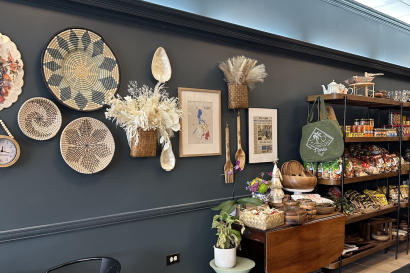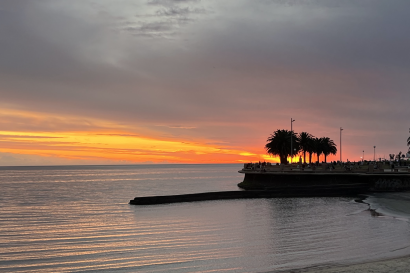
With pedestrians bustling, passing cars swooshing, and towering high-rises glazed with summer sun, Buenos Aires is a breathing organism. The metropolis’s plentiful sites complement its culture. Art museums house a diverse array of European and Latin-American pieces, reflecting the culture’s rich intersection.
While visiting these museums, I attempted to fully appreciate the art. Artworks have always left my mind seemingly undigested, as if I had missed its totality. I wanted to change this. Instead of glances, I stood staring at exhibits. The art became not the product before me but the subtleties comprising it. Every brush stroke or construction was calculated. It serves a purpose. It reminded me of how one can see a dusk sky but not how it can beautifully present a wave of saffron orange and meld it with a subtle gradient of thistle violet. Thehuesarecoalesced. The colors’ meeting point is infinitesimally precise, nearly nonexistent. Whether concretely or abstractly, the artist conveys her message by using all aspects of her work to approach such an infinite point. How else can a human truly represent the complexity within and around us?
As I navigate life in Buenos Aires, I find it akin to a massive painting. I see its people and its movement, but what of the subtleties?
Earlier last week, I finished a book from the IES Abroad Center. Its mission was to summarize over 13,000 years of human history relating to civilization formation, how different societies found themselves seemingly “ahead” or “behind” in the modern world. It began with the history of food production. As it meticulously relayed how various crops were domesticated, my mind conjured an image of a primitive farmer nurturing wild plants. Multiply this by a few millennia and multiple geographic regions and you have what resulted in our dishes today. All this time I had spent unappreciative of vegetables. (I eventually closed the book and had the best salad I’ve ever eaten.)
Vegetables changed for me and so did the city. Even neglecting the intricacies of how mass civilizations were only possible because of factors like fixed agricultural locations leading to an increase of non-food producing specialists to organize structured societal institutions, the creation is beautifully complex.
And here I am, with the opportunity to study Buenos Aires's distinct economic history, a significant facet of the creation, with the necessary objectivity. I haven’t been honed to favor one political party over another or been presented with a grossly over-polarized view of political mechanisms. Instead, I’m being handed the moving parts, a benched player that knows their sneakers will never touch the court.

Omar Uddin
<p>My name is Omar, and I am a student in the Ross School of Business at the University of Michigan. As a major in Business Administration, I'm primarily concerned with how business practices can be leveraged in the social impact realm. I'm hoping I will be able to use all that I have learned and all that I will learn to have a positive effect on society.</p>







